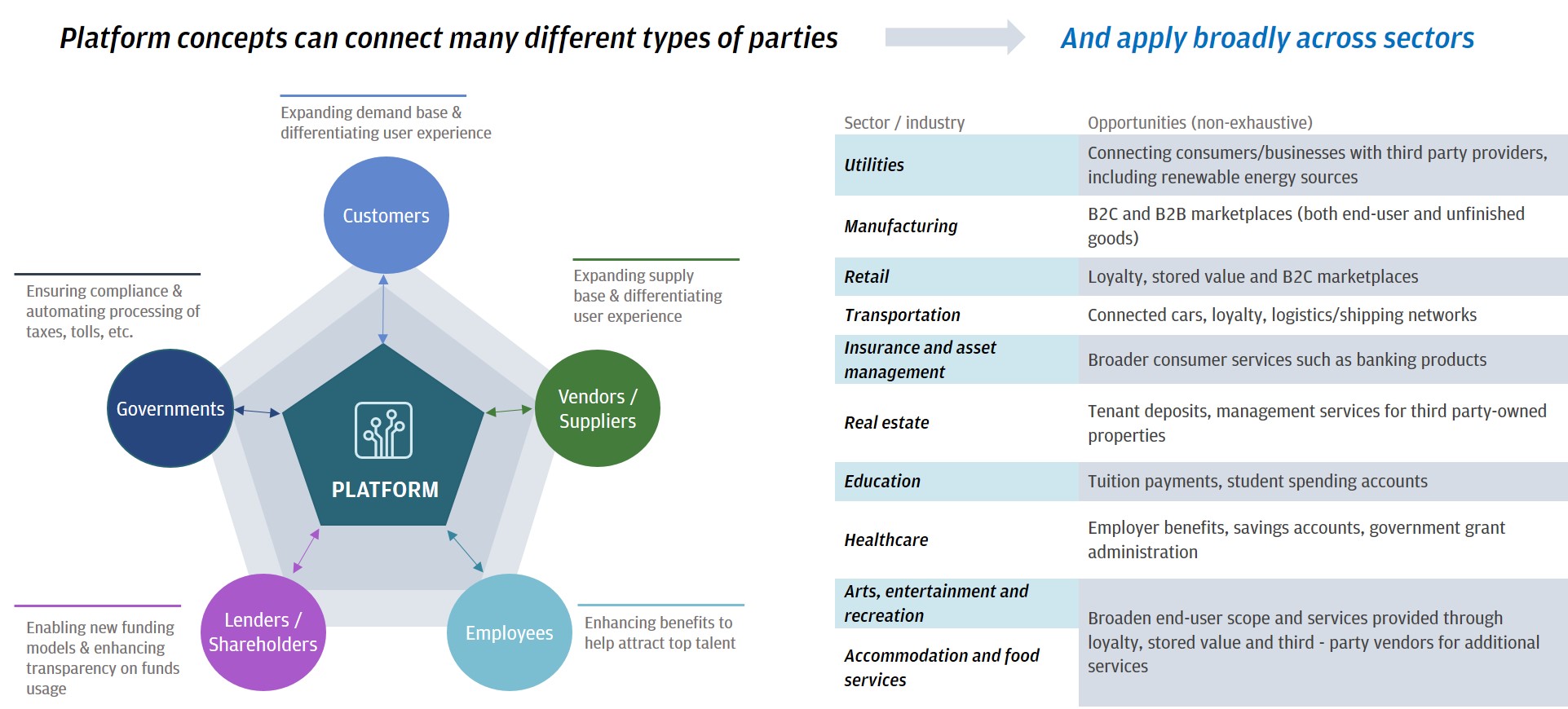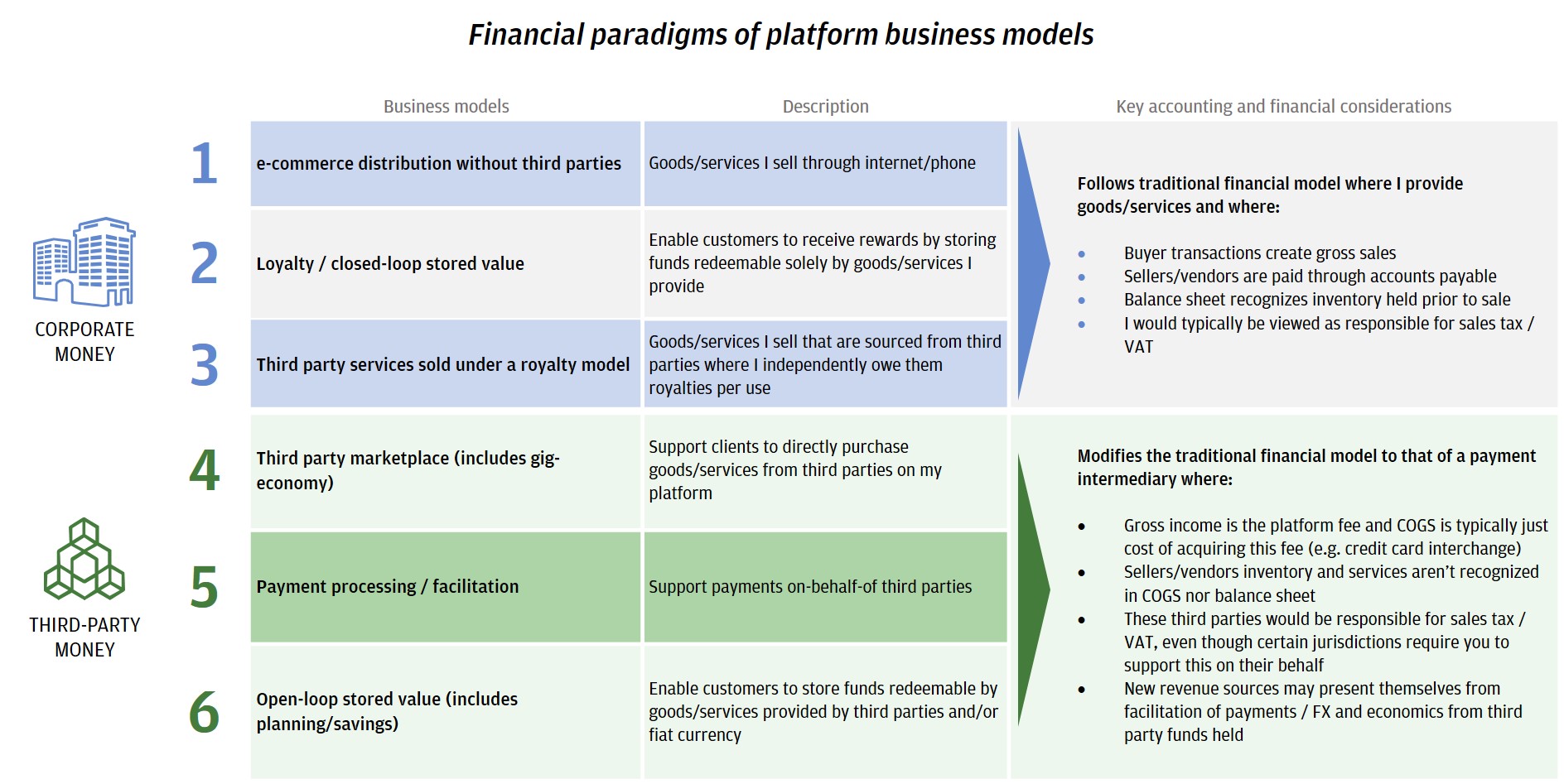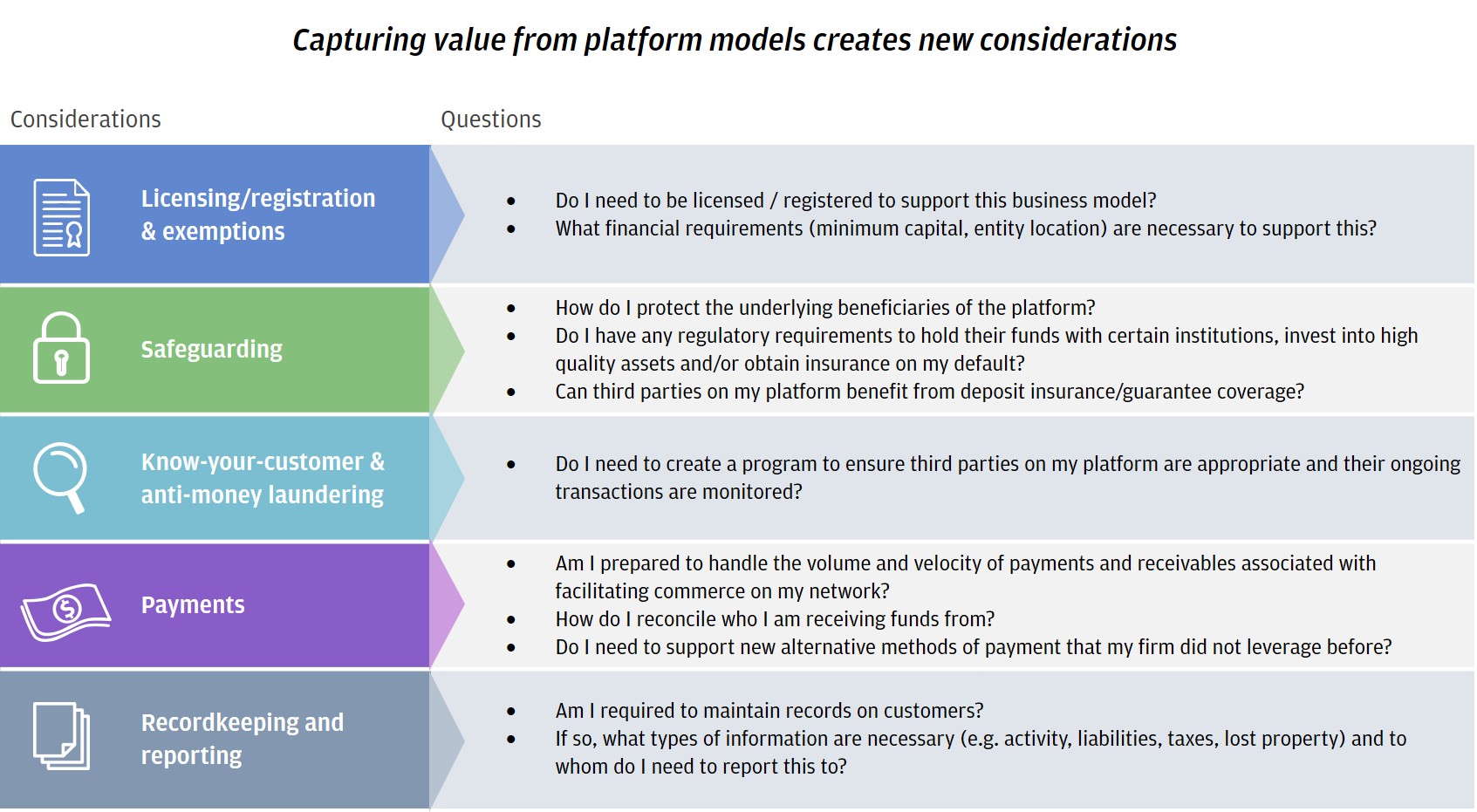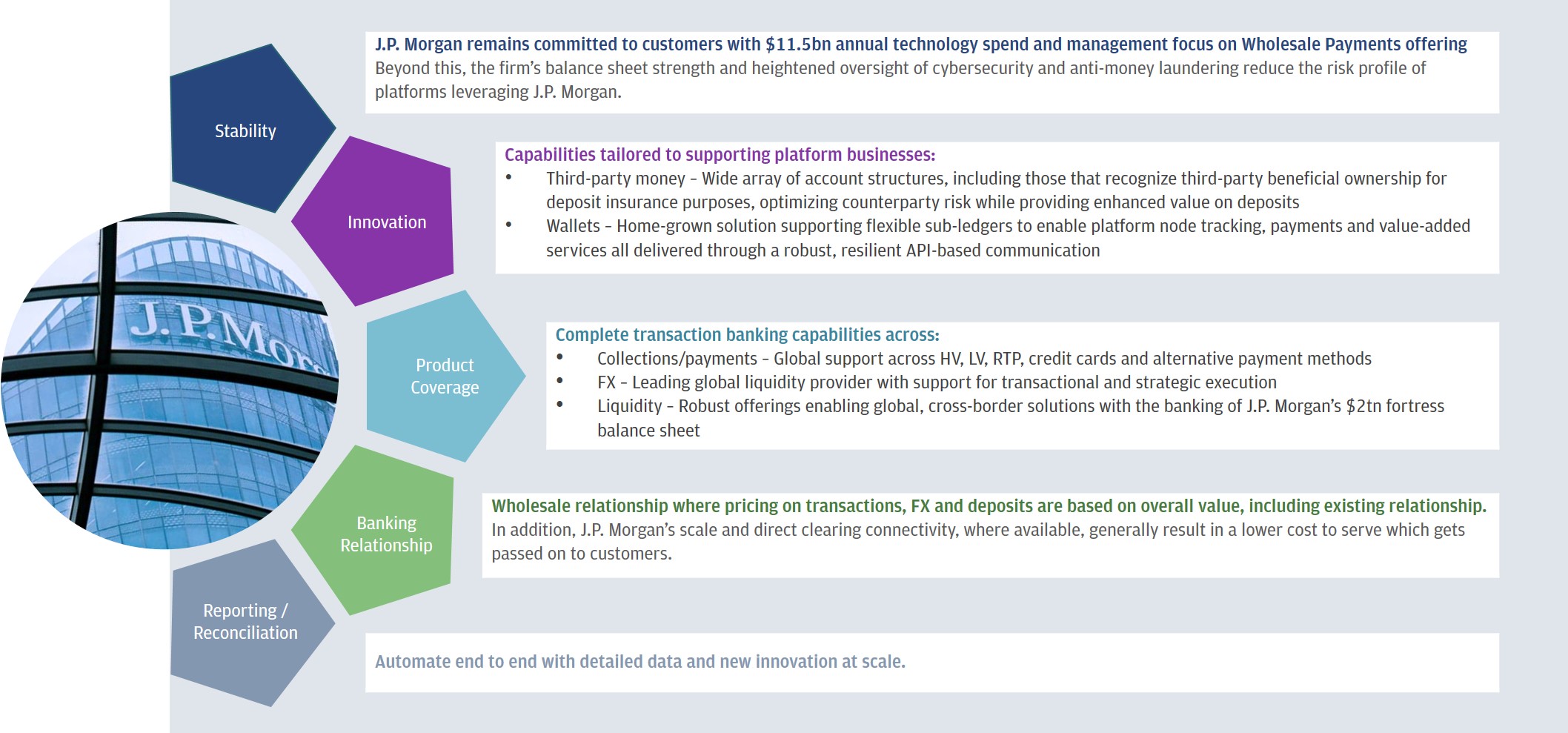
Firms that employ platform business models by harnessing digital technologies to unlock the value of their network continue to have strong valuations. The current business environment, as impacted by the developments related to the COVID-19 pandemic, has served as a catalyst for other companies to accelerate their digital-first and direct-to-consumer models. This article explores how platforms are not only transforming business challenges and rewards but also transforming requirements for transaction banking providers.
The emergence of the platform business model
Quite simply, a platform is a business model that creates value by bringing together a network of independent parties to facilitate the exchange of information or provision of goods/services. Digitally native companies, such as gig-economy operators, marketplaces and payment facilitators have increasingly used this model to act as a visible intermediary supporting commerce between their customers, sellers, vendors and other third parties. While “Silicon Valley” firms have successfully employed platform models, this concept can be leveraged in a much broader context.
- Rewards: Brand new customers / business lines, further revenue penetration from existing customers through loyalty programs and distribution models that are more resilient to disruptions.
- Challenges: New competitors, enticing participants to join your network and expense to keep participants on the platform, including protecting customer information.

Not all platforms are created equal
At the heart of nearly every platform is the objective to create a network that generates throughput by adding value to each node on the network…but the financial impact this creates on the operator depends on the type of relationship being pursued with the network. We believe there are six business models used by successful firms to maximize value of their network, which are divided into two paradigms driving the financial impact on a firm.
- Rewards: Transforming financial footprint of business to be more friendly to gross margin and reduce balance sheet leverage.
- Challenges: Accommodating changes to internal tax, finance and treasury processes to properly support new business model.

Platform differences extend beyond financial statements
Beyond important financial considerations mentioned, these models have broader impacts to a firm’s operations, payments usage and potentially even corporate structure – particularly when employing a platform involving third-party money. Most firms will need to engage a transaction banking provider to help meet these requirements.
- Rewards:Ability for the platform operator to earn incremental revenues from being a financial intermediary in funds, payments and FX.
- Challenges: Costs from implementing appropriate corporate structure and exposure to transactional bank relationships to support more complex, voluminous activities.

J.P. Morgan is here to support you on your platform journey, where you continue to own your client relationships
Given the complexity and effort needed to properly structure a successful third-party platform business, firms may quickly realize that choice of transaction banking provider has a more profound role in business success than in traditional business models. This stems in part from contractual relationships with end-customers, how payment experience is exposed to network participants, and the degree to which platform economics are impacted by the cost of payments and earnings on liquidity created from third-party activities. J.P. Morgan’s philosophy on supporting firms embarking on platform business models revolves around the process of nurturing customers to the new requirements to support such business models, maintaining a wholesale banking relationship to enable firms to maximize value from this new revenue source, structuring accounts to optimize deposit treatment and heavily investing in innovative solutions such as Wallet to enrich the operational experience.
- Rewards:Maintaining brand and loyalty by directly owning customer relationships while accessing capabilities of a global financial services firm that is committed to supporting clients over the long-term.
- Challenges: Extending normal business costs to supporting new client activities and incremental costs of maintaining compliance with licensing and regulations.

Helping clients optimize working capital is a key strategic priority for J.P.& Morgan. Wherever you are on your digital journey, we stand ready to support you in crafting tailored and efficient solutions.
This material was prepared exclusively for the benefit and internal use of the JPMorgan client to whom it is directly addressed (including such client’s subsidiaries, the “Company”) in order to assist the Company in evaluating a possible transaction(s) and does not carry any right of disclosure to any other party. In preparing this material, we have relied upon and assumed, without independent verification, the accuracy and completeness of all information available from public sources or which was provided to us by or on behalf of the Company or which was otherwise reviewed by us. This material is for discussion purposes only and is incomplete without reference to the other briefings provided by JPMorgan. Neither this material nor any of its contents may be disclosed or used for any other purpose without the prior written consent of JPMorgan.
J.P. Morgan, JPMorgan, JPMorgan Chase and Chase are marketing names for certain businesses of JPMorgan Chase & Co. and its subsidiaries worldwide (collectively, “JPMC”). Products or services may be marketed and/or provided by commercial banks such as JPMorgan Chase Bank, N.A., securities or other non-banking affiliates or other JPMC entities. JPMC contact persons may be employees or officers of any of the foregoing entities and the terms “J.P. Morgan”, “JPMorgan”, “JPMorgan Chase” and “Chase” if and as used herein include as applicable all such employees or officers and/or entities irrespective of marketing name(s) used. Nothing in this material is a solicitation by JPMC of any product or service which would be unlawful under applicable laws or regulations.
Investments or strategies discussed herein may not be suitable for all investors. Neither JPMorgan nor any of its directors, officers, employees or agents shall incur in any responsibility or liability whatsoever to the Company or any other party with respect to the contents of any matters referred herein, or discussed as a result of, this material. This material is not intended to provide, and should not be relied on for, accounting, legal or tax advice or investment recommendations. Please consult your own tax, legal, accounting or investment advisor concerning such matters.
Not all products and services are available in all geographic areas. Eligibility for particular products and services is subject to final determination by JPMC and or its affiliates/subsidiaries. This material does not constitute a commitment by any JPMC entity to extend or arrange credit or to provide any other products or services and JPMorgan reserves the right to withdraw at any time. All services are subject to applicable laws, regulations, and applicable approvals and notifications. The Company should examine the specific restrictions and limitations under the laws of its own jurisdiction that may be applicable to the Company due to its nature or to the products and services referred herein.
Not withstanding anything to the contrary, the statements in this material are not intended to be legally binding. Any products, services, terms or other matters described herein (other than in respect of confidentiality) are subject to the terms of separate legally binding documentation and/or are subject to change without notice.
Changes to Interbank Offered Rates (IBORs) and other benchmark rates: Certain interest rate benchmarks are, or may in the future become, subject to ongoing international, national and other regulatory guidance, reform and proposals for reform. For more information, please consult: https://www.jpmorgan.com/global/disclosures/interbank_offered_rates.
JPMorgan Chase Bank, N.A. Member FDIC.
JPMorgan Chase Bank, N.A., organized under the laws of U.S.A. with limited liability.







